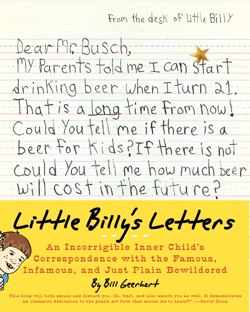Little Billy’s Letters
 Humorist Bill Geerhart wrote a series of letters to famous and infamous people in the voice of “his inner child, 10-year-old Billy.” They’ve been published as Little Billy’s Letters: An Incorrigible Inner Child’s Correspondence with the Famous, Infamous, and Just Plain Bewildered.
Humorist Bill Geerhart wrote a series of letters to famous and infamous people in the voice of “his inner child, 10-year-old Billy.” They’ve been published as Little Billy’s Letters: An Incorrigible Inner Child’s Correspondence with the Famous, Infamous, and Just Plain Bewildered.
Boing Boing‘s Mark Frauenfelter reproduces some of his favorites, including exchanges with the National Hobo Association, Manson Family member Susan Atkins, OJ lawyer Robert Shapiro, and Cardinal Mahoney of Los Angeles.
While “Billy’s” letters were often insipid and insulting, the responses — at least those selected by Frauenfelter — were unfailingly polite and helpful. Shapiro’s was the funniest and Atkins the saddest. But all of them advised Billy to study hard, mind his parents, and treat people well.
AP summarizes some of the other exchanges:
- Attorney General Janet Reno, writing to settle the issue of whether Batman or the Terminator is the better crime fighter: “I read Batman comics when I was your age so I know of his efforts to fight crime better than I know of the Terminator’s work.”
- Former presidential candidate and Massachusetts Gov. Michael Dukakis, on Billy’s run for third-grade class president: “You may be on the verge of a great political career. The first office for which I ever ran and won was as president of my third grade class! You, too, may become a governor and run for the presidency!”
- Former Defense Secretary Robert S. McNamara, advising Billy on whether he should dig a moat around his treehouse to keep his enemies away: “It will work if you dig it deep enough; and your enemies can’t swim!”
Geez, reinventing the wheel again. First, the Onion goes where George Carlin went years ago (google ‘carlin wonderful wino’ and ‘carlin news cast 1967’), now someone is treading ground furiously and hilariously plowed up by Don Novello years ago:
Actually, there is a whole literary genre of letter hoaxers and it did not start with Don Novello. It probably started with a guy named Humprhy Berkeley in the late 1940s. A book of these letters was published in England in 1974 called “Rochester Sneath.”